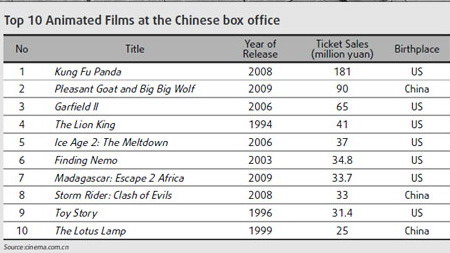
|
BIZCHINA> Top Biz News
 |
|
Film's success a shot in the arm for animation
By Song Hongmei (China Daily)
Updated: 2009-05-18 08:05
 The big screen version of the Chinese cartoon Pleasant Goat and Big Big Wolf is running second only to Kung Fu Panda in box office takings for animated films in China. The 6 million-yuan surprise hit grossed more than 90 million yuan in its first month, 30 million yuan of which came from its opening weekend in January. What the movie lacks in terms of plot and hi-tech special effects, it makes up for with its simple tale of a battle of wits between a herd of goats and a pair of wolves. It was also boosted by the huge number of fans the television series it is based on attracted. A total of 500 episodes have been shown on nearly 50 TV stations over the past three years. Speaking at the 5th China International Cartoon and Animation Festival in Hangzhou, Zhejiang province, Liu Yong, operations director of Shanghai Media Group (SMG), one of the producers of the animation, also praised the strong marketing campaign, which included organizing parties for children at cinemas. Before the screening, SMG and its partner, Guangzhou Creative Power Entertaining, sent promotional New Year cards to kindergarten children and forked out for a big advertising campaign across TV, radio, newspapers, websites and other media throughout the country.
Their efforts clearly paid off. Five-year-old Zhang Yisu said at the animation festival that she watched the film twice with her parents. Plans are now afoot for a sequel to be released during the next school winter vacation, according to Liu Yong. Zhong Luming, editor of Animation and Comic Weekly, predicted the follow-up could make between 130 and 150 million yuan. Xie Kunzhe, general manager of Guangdong Alpha Animation and Culture Co Ltd's brand department, agreed but added the sequel must pay attention to detail. Otherwise, he said, it might earn only 30 to 50 million yuan.
It took the producers of Pleasant Goat one year to bring the film to audiences, in contrast with the five years spent on research and planning for Kung Fu Panda. The success of Pleasant Goat is a shot in the arm for the domestic animation industry. However, Jin Delong, deputy editor-in-chief of the State Administration of Radio, Film and Television (SARFT), issued a note of caution. "China's animation producers still have a long way to go before they can catch up with their foreign rivals in design, production and promotion," he said. Zhu Yuqi, general manager of a Fujian-based animation company, commented: "Although the content of Pleasant Goat is not as good as its foreign rivals, it is the best Chinese animated film currently out, so children accept it." He is working and re-working an animation film script telling the story of Matsu, the goddess of the sea who protects fishermen and sailors, in an attempt to emulate the success of Kung Fu Panda and Pleasant Goat. Mark Osborne, co-director of Kung Fu Panda, attended the animation festival, where he discussed the determination required to make an animated film. Zhu Yuqi and fellow up-and-coming animator Wu Zheng paid close attention. Wu, a 26-year-old playwright who has been unemployed for more than six months, said: "There is a rosy future for China's animation industry which will belong to us young animators." Last year Wu had to quit his job at a Shanghai-based animation company when his boss, like many others in the business, decided to work for US and Japanese clients instead of supporting domestic content. (For more biz stories, please visit Industries)
|